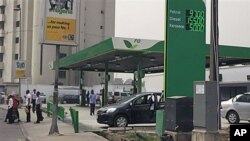Nigeria has entered a new period of political unrest following the government's decision to abolish a consumer fuel subsidy, causing prices to more than double at the pump. The increase has since been eased in response to a national strike. The price shock is prompting Nigerians to ask why Africa's largest oil exporter is forced to import so much of its domestic fuel supply.
Valentine Ngema fidgets nervously as he sits behind the wheel of his car. He's been waiting more than an hour for his turn at the gas pump.
Like other Nigerians, Ngema has been through a roller coaster ride since the government removed gasoline subsidies on New Year's Day, a move that initally more than doubled the cost to consumers.
But now that nationwide protests have forced the government to retreat a bit, supplies have dried up. Ngema said the price fluctuations are an indication of corruption.
"The oil industry is corrupt. They have hijacked everything. That's why we are suffering now," Ngema says.
Another motorist idling his car along the road, Toby Onofego, wonders why Africa's leading exporter of crude oil has so little refining capacity that it must import most of its gasoline.
"We have the crude oil, we produce the raw material, and in fact we are one of the largest oil producers as well, and I don't think we're supposed to be suffering like this. It's stressful," said Onofego.
Though tensions have eased since the strike ended, Nigerians are seething with anger at the realization that what they thought was a government oil subsidy to help them survive, may have hidden systematic theft by government cronies.
At a Nigerian congressional hearing this week, Farouk Lawan, chairman of the Ad Hoc Committee on Fuel Subsidies, charged that last year as much as 14 million liters a day of imported oil disappeared.
"Take 2011; the per-day discharge is 59 million liters per day. What that means is that the gap of 14 million [liters] per day is paid for by Nigerians as subsidy, but which is not utilized in Nigeria. And it means someone, somehow is being shortchanged, and of course that is the ordinary Nigerian," said Lawan.
The government initially justified abolishing the oil subsidy by saying it was aimed at breaking the stranglehold of unscrupulous operators. But anti-corruption campaigner Garba Umar Kari said the latest revelations seem to implicate government officials.
"It is the most lucrative setup. All you need to do to get a license to import refined petroleum is to know the minister of petroleum or a senior official within the oil ministry," said Kari. "It has been alleged that they use members of their families, they use their friends, they use ruling party officials. They simply give them licenses and allocate thousands of liters for them."
Kari said a sharp rise in the amount of oil the government said it imported last year has given rise to allegations that the proceeds were diverted for political campaigns.
"What everybody was saying secretly is that the money was used for the 2011 elections. That's why Nigerians are angry. They are saying that the overspent money was used for political campaigns to get the president re-elected," said Kari.
President Goodluck Jonathan's government has asked the country's Economic and Financial Crimes Commission to investigate the charges. The prospect of a probe by a commission feared for its investigative prowess, however, has done little to calm public concerns about official corruption.
Nigerian Fuel Price Spike Sparks Corruption Probe




